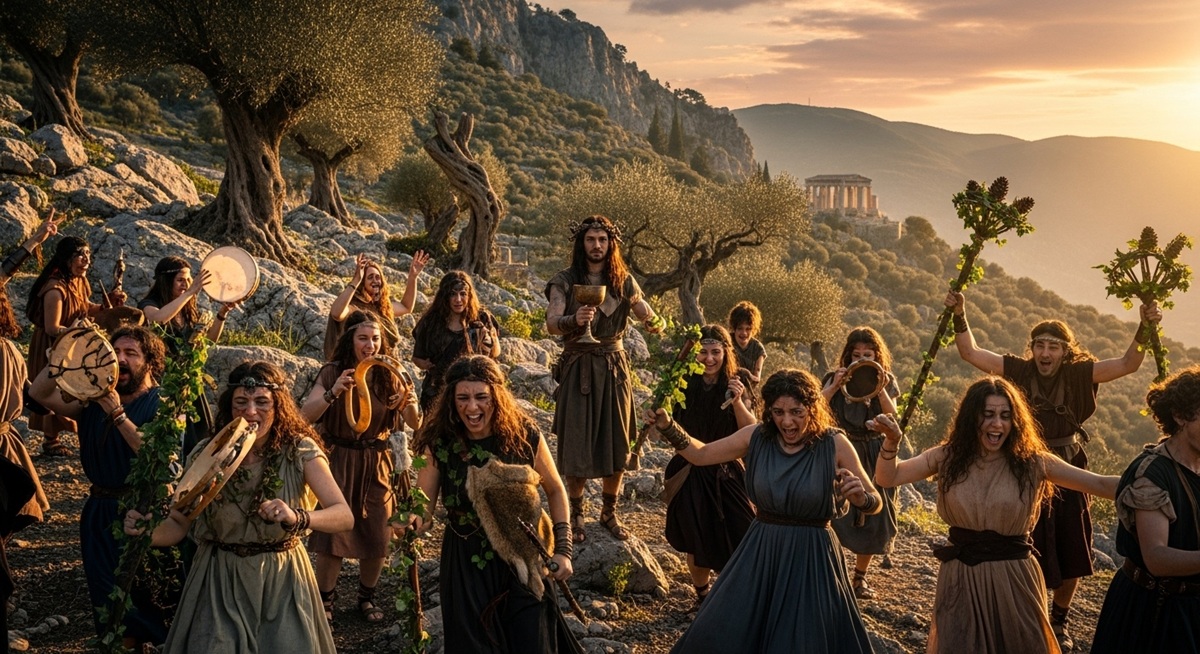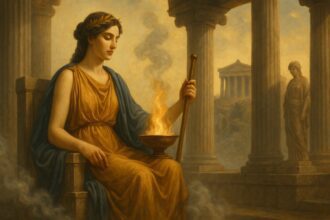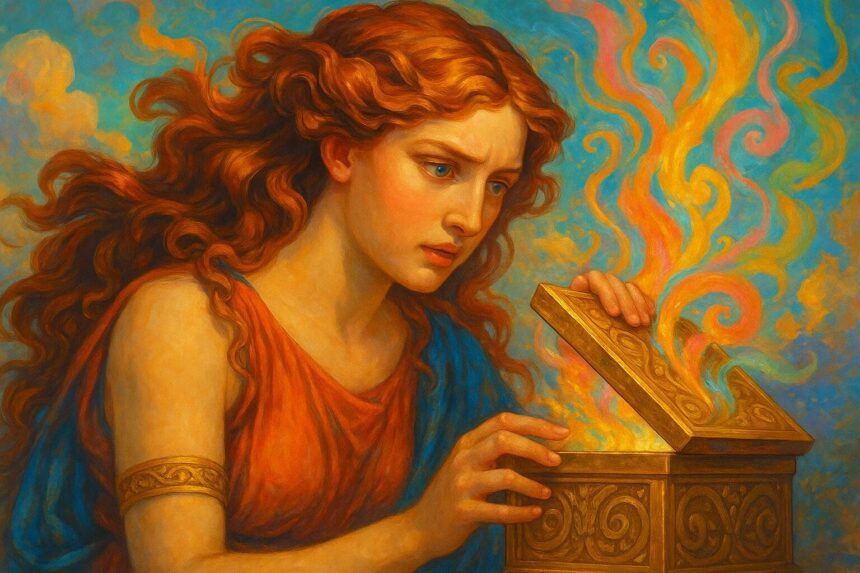Imagine stepping into the sun-drenched ruins of ancient Thebes, where the air hums with whispers of forgotten gods and untamed rituals. Or picture yourself trekking up the rugged slopes of Mount Cithaeron, the very mountain that once echoed with the frenzied cries of the Maenads, those wild devotees of Dionysus. This is a living pulse, a chaotic symphony of joy and terror that still reverberates through the vineyards, festivals, and hidden paths of modern Greece. The story of the Bacchae, as captured in Euripides’ timeless tragedy, is an invitation to explore the razor-thin line between civilization and primal release, reason and rapture. For travelers seeking something deeper than postcard snapshots, this myth transforms a trip to Greece into a pilgrimage of the soul, one where history, nature, and the divine collide in breathtaking ways.
In a world obsessed with control and schedules, the Bacchae reminds us of the intoxicating power of letting go. It’s a narrative that has inspired artists, philosophers, and wanderers for millennia, from Nietzsche’s ecstatic philosophies to the throbbing beats of contemporary raves. But why does it matter today? Because as you sip robust Greek wines under olive groves or join a village feast that stretches into the wee hours, you’re not just vacationing but communing with Dionysus himself, the god who demands we dance on the edge of madness.
The Birth of a God of Contradictions
At the heart of the Bacchae beats the enigmatic figure of Dionysus, the Olympian deity who embodies everything wild and transformative. Unlike the stern Zeus or the wise Athena, Dionysus arrived in the pantheon as an outsider, a god born from scandal and divine trickery. His mother, Semele, a mortal princess of Thebes, was seduced by Zeus in a moment of deceptive passion, Zeus appearing as a mortal to hide his true form. But Hera, ever the jealous queen, unraveled the ruse, tricking Semele into demanding Zeus reveal himself in all his thunderous glory. The mortal woman perished in the blaze of divine fire, but Zeus rescued their unborn child, sewing him into his thigh until he could emerge fully formed.
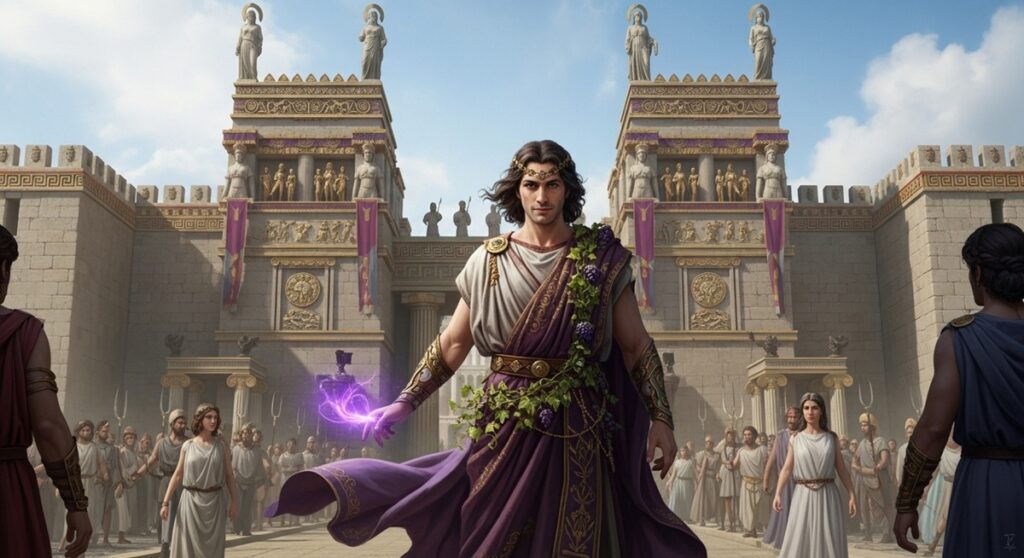
This origin story alone sets Dionysus apart. He’s not born in the sterile halls of Olympus but forged in the fires of mortality and immortality, a bridge between worlds. In Greek mythology, he’s the patron of wine, theater, fertility, and ritual madness, a force that brings both ecstasy and destruction. His arrival in Thebes, his maternal homeland, marks the explosive beginning of Euripides’ play. Disguised as a charismatic stranger with flowing locks and an aura of mystery, Dionysus seeks worship from a city that has long forgotten his lineage. Thebes, once a cradle of heroes like Hercules and Oedipus, now stands as a symbol of rigid order under King Pentheus, Semele’s grandson and Dionysus‘s own kin.
The Clash of Worlds: Pentheus and the Denial of the Divine
Pentheus represents everything Dionysus disrupts: unyielding authority, patriarchal control, and a disdain for the irrational. As the young king, he views the emerging cult of Dionysus, with its women abandoning looms and hearths for mountain revels, as a threat to social fabric.
“These women have left their shuttles for the loom of folly,” he sneers, blind to the deeper truth.
In the play, Pentheus‘s refusal isn’t just personal; it’s a cosmic affront. Dionysus, after all, is the son of Zeus, and denying him is denying the thunder god’s will.
Euripides masterfully weaves this conflict to probe the human psyche. Pentheus embodies the Apollonian ideal—logic, structure, restraint, while Dionysus unleashes the Dionysian frenzy that Friedrich Nietzsche would later celebrate as essential to creativity and life force. The god’s cult isn’t mere debauchery; it’s a sacred release, a way for the oppressed (especially women in ancient society) to reclaim agency through dance, song, and intoxication. As the chorus of Asian Bacchae sings, it’s a call to “bless the bride of gold-rich Lydia,” evoking the fertile, flowing abundance that Dionysus promises.
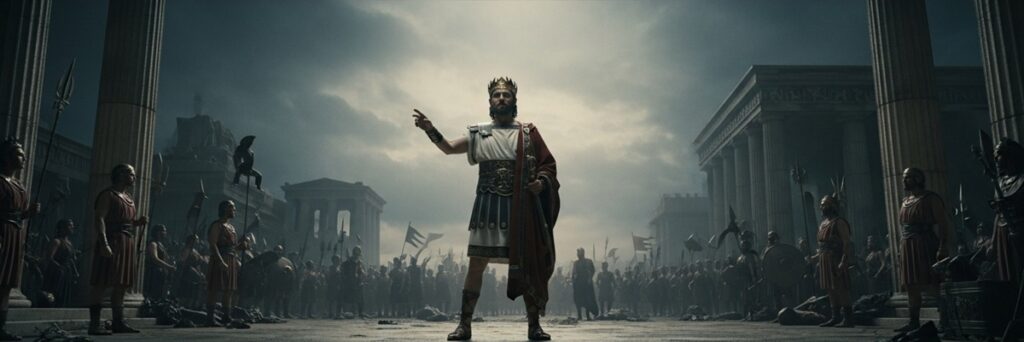
But denial breeds catastrophe. Dionysus‘s power manifests subtly at first: earthquakes shake the palace, vines sprout from the earth, and the women of Thebes vanish into the hills. Pentheus‘s spies return with tales of miracles, streams of wine bubbling from rocks, wild beasts offering themselves as prey. Yet the king doubles down, ordering the arrest of the “stranger” (Dionysus in disguise). What follows is a psychological seduction: the god toys with Pentheus‘s repressed desires, planting seeds of curiosity that will bloom into doom.
The Maenads’ Frenzy: Ecstasy on Mount Cithaeron

No element of the Bacchae captures the imagination quite like the Maenads, those raving women who become the god’s instruments of vengeance and revelation. Transformed from dutiful wives and mothers, they don fawn skins, wreathe their hair with ivy and serpents, and wield the thyrsus—a staff of fennel topped with a pinecone, symbolizing both fertility and phallic potency. Under the moonlit peaks of Mount Cithaeron, they form a whirlwind of worship: dancing in choruses that blend hymn and howl, their bodies slick with sweat and divine possession.
The Rituals of Release: What the Maenads Represent
In ancient Greece, the Maenads weren’t fictional inventions; they drew from real Dionysian mysteries, secretive rites held in remote sanctuaries. Euripides paints their ecstasy vividly: “The women handle snakes that lick their cheeks… and they strike the fellas with their wands.” Milk and honey spring from the earth, not from effort but from surrender to the god. This isn’t chaos for chaos’s sake, it’s a profound communion. The Maenads embody the cathartic power of ritual, where societal norms dissolve, and participants touch the divine through sensory overload.
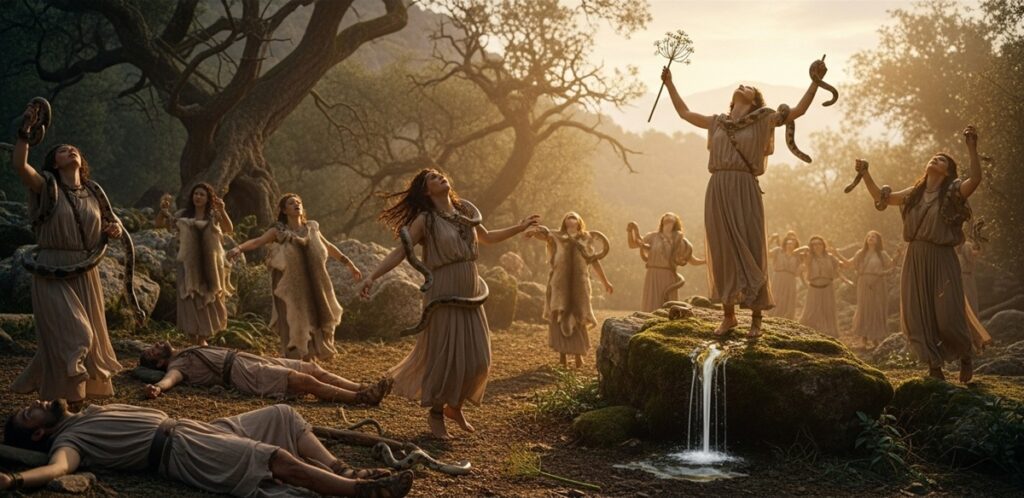
For women in patriarchal Thebes, this was revolutionary. Leaving the oikos (household) for the wilds inverted gender roles, allowing a taste of freedom that the everyday world denied. Yet Euripides tempers the romance with peril: the frenzy blinds them to reality, turning worship into violence. It’s this duality—liberation laced with danger—that makes the Maenads so compelling. They mirror our own inner wildness, the part of us that yearns to break free from routines and roar into the night.
Pentheus’s Disguise and the Tragic Unraveling
Curiosity, that double-edged sword, proves Pentheus‘s undoing. Goaded by the disguised Dionysus, he agrees to spy on the Maenads by donning female garb—a flowing robe, wig, and makeup that mock his masculinity.
“I’ll go as a sly watcher,” he boasts, but the god whispers, “Dress in the long trailing robe… and put a wig of flowing curls upon your head.”
It’s a moment of ironic humiliation, stripping the king of his armor of authority.
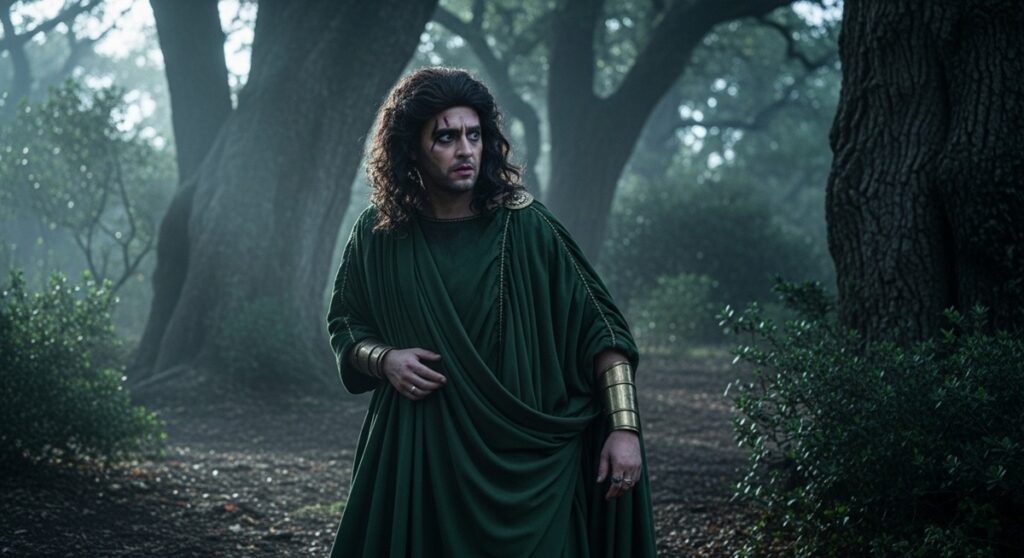
Ascending Mount Cithaeron, Pentheus peers from the foliage, his voyeurism a metaphor for suppressed desires. But the Maenads, deep in trance, sense an intruder. Led by Agave, Pentheus‘s mother, they mistake him for a mountain lion. In a sparagmos (ritual tearing), they dismember him alive, Agave brandishing his head like a trophy, crying, “See the lion’s head I bring from the mountain!” Only in the cold light of dawn does the horror dawn: mother slaying son in god-induced madness.
This climax isn’t gratuitous gore; it’s a profound tragedy. Pentheus‘s death underscores the myth’s core warning: suppress the Dionysian at your peril. To live solely by reason invites the repressed to erupt catastrophically. As the chorus laments, “What is wisdom? What gift of the gods… sweeter for mortals than to hold the hand of sovereignty over the earth?” Yet Dionysus teaches that true sovereignty demands honoring all facets of existence—the tame and the feral alike.
Echoes in the Landscape: Tracing Dionysus Through Modern Greece
The beauty of the Bacchae lies in its tangibility. Unlike abstract myths set in ethereal realms, this one is rooted in real places you can visit today. Greece, with its labyrinth of ancient sites and vibrant traditions, beckons travelers to follow Dionysus‘s trail. It’s an odyssey that blends archaeology, adventure, and indulgence, turning a standard tour into a mythic quest. Whether you’re a history buff, a wine lover, or a seeker of spiritual vibes, these destinations pulse with the god’s energy.
Thebes: Where Gods Demanded Reckoning
Start your journey in Thebes (modern Thiva), the mythic epicenter. This Boeotian city, just an hour from Athens, cradles the palace where Dionysus was denied and Pentheus ruled. Wander the Archaeological Museum of Thebes, where artifacts like bronze mirrors and ivory combs evoke Semele’s tragic beauty. The site’s acropolis, with its cyclopean walls, overlooks the plain where the god’s cult first sparked controversy.
But don’t stop at ruins, stroll the quiet streets lined with tavernas serving meze and local wines. Imagine Pentheus storming through these alleys, his spies trailing the Bacchic pilgrims. For more intrigue, join a guided tour of the Cadmeia hill, where excavations reveal layers of Mycenaean and classical history. It’s here, amid olive trees and wild herbs, that you feel the weight of denial: the gods don’t forget, and neither does the land.
Mount Cithaeron: Hiking into the Heart of Frenzy
No visit to the Bacchae‘s world is complete without ascending Mount Cithaeron (Kithairon), the sacred massif straddling Attica and Boeotia. At 1,413 meters, it’s a hiker’s paradise—rugged trails winding through pine forests, wildflower meadows, and dramatic gorges. In spring, the slopes burst with orchids and thyme, mirroring the spontaneous abundance of the myth.
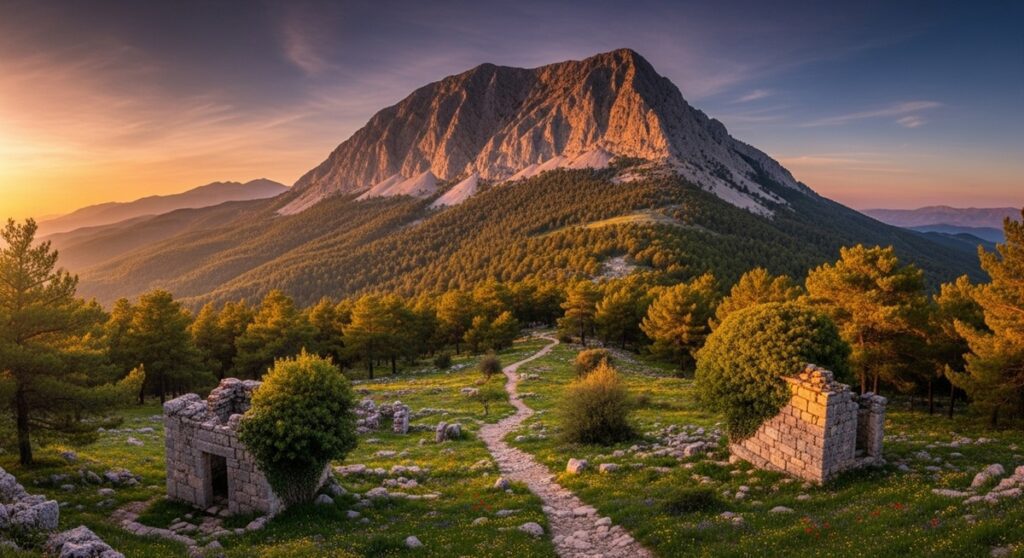
Follow the path from Plataea village upward, pausing at ancient sanctuaries like the one at Vagia, dedicated to Dionysus and his mother. As you climb, the air grows crisp, and solitude envelops you, perfect for reflecting on the Maenads‘ dances. Pack a picnic of feta, olives, and a flask of Nemea red; at sunset, from a ridge, you’ll swear you hear faint echoes of thyrsus rattles. For the adventurous, overnight in a mountain refuge or camp under the stars, channeling that primal connection to nature. Just remember: respect the wild—Dionysus‘s domain demands it.
Vineyards and Wine Trails: Tasting the God’s Gift
Dionysus‘s ultimate legacy? Wine, the nectar that loosens tongues and spirits. Greece’s viticultural heritage is a direct line to the god, with regions that feel like extensions of the myth. Head to Nemea, in the Peloponnese, where the Agiorgitiko grape yields bold, velvety reds evoking the “blood of the earth” from Bacchic lore. Tour domaines like Skouras Winery, nestled amid amphitheater vineyards that climb toward ancient ruins. Learn how terraced slopes mimic the mountain revels, and sample vintages paired with tales of Dionysus‘s wanderings.
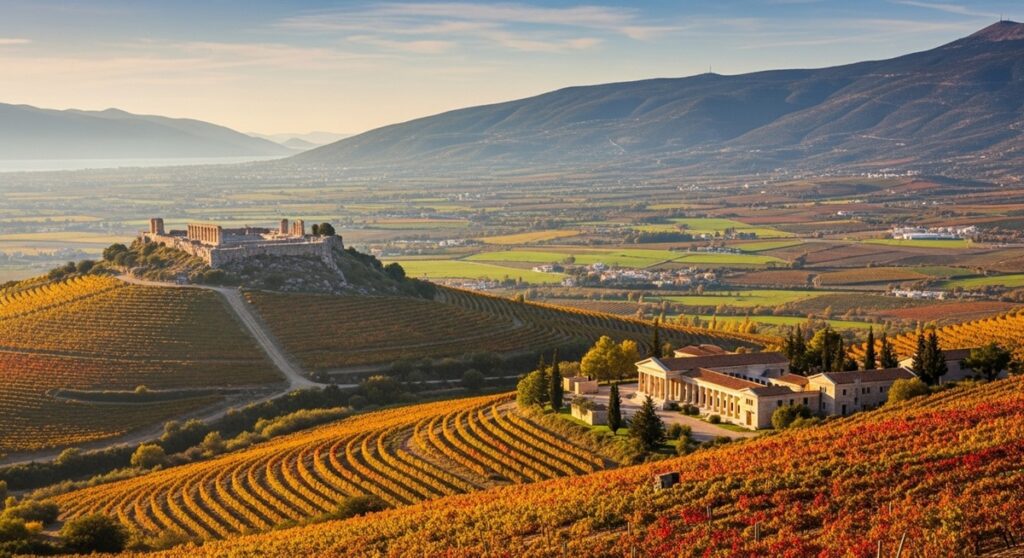
Further afield, Santorini’s black-sand vineyards produce Assyrtiko, a crisp white born from volcanic soil—much like the fiery birth of the god. Hike the caldera’s trails, visiting wineries perched on cliffs, where the sea breeze carries hints of pine and citrus. Or explore Naoussa in Macedonia, home to Xinomavro, a grape with Nebbiolo-like tannins. These aren’t just tastings; they’re rituals. Join a harvest festival in September, stomping grapes barefoot amid laughter and song, echoes of the Maenads‘ joy.
For a full immersion, consider the Wine Roads of Greece itinerary: multicounty routes blending Dionysus lore with enology. From Crete’s sweet Malvasia to Epirus’s mountain reds, each sip reconnects you to the god’s transformative elixir.
Festivals: Reviving the Bacchic Spirit
Greece doesn’t let Dionysus fade into obscurity—his essence throbs in annual celebrations that blend ancient rites with modern merriment. The Dionysia festivals, though evolved, still honor him. In Athens, the City Dionysia (March) features theater performances, including modern takes on Euripides’ play, amid parades and wine flows.
But for authentic frenzy, venture to rural feasts. The Panigiri in Tinos or Skiathos explodes with music, dance, and ouzo under the stars—women in traditional garb circling in steps that recall the Maenads. In September, Nemea’s Wine Festival draws thousands for tastings, live bouzouki, and grape-crushing contests. Or attend the Bacchanalia-inspired events at the Athens Epidaurus Festival, where tragedy meets contemporary art.
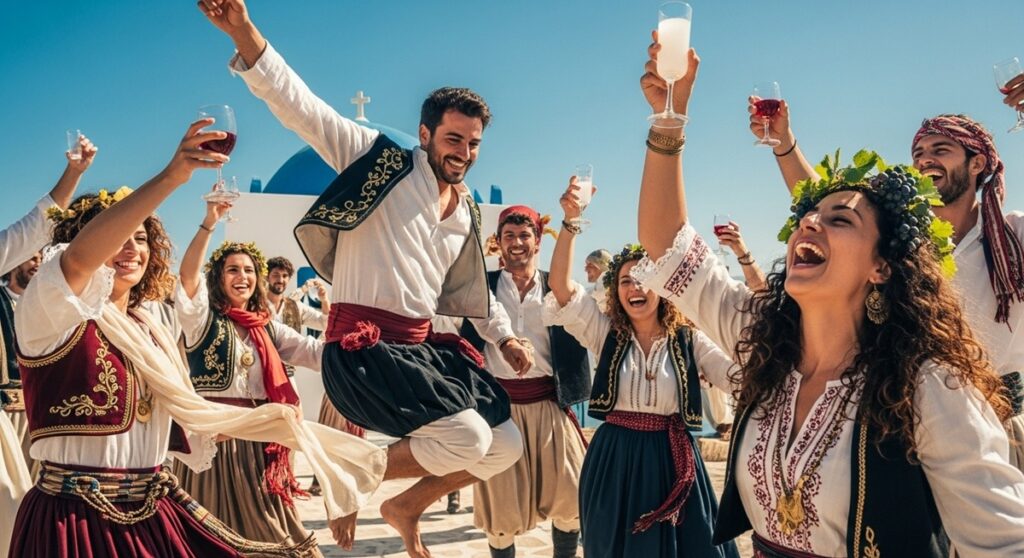
These gatherings foster community, much like the original cults: strangers become kin in a haze of revelry. Pro tip: Time your trip for Easter or summer solstice, when island hopping amplifies the vibe—Mykonos parties nod to Dionysus‘s hedonism, while quieter Cyclades spots offer contemplative toasts.
The Timeless Wisdom of the Bacchae: Lessons for the Modern Soul
Why does the Bacchae endure? In our era of burnout and digital detachment, it screams for balance. Pentheus‘s tragedy warns against over-rationality—the executive who suppresses joy until it implodes. The Maenads caution against unchecked impulse, yet celebrate the therapy of release: think yoga retreats or music festivals as sanitized echoes.
Philosophers from Plato (who banished poets from his republic) to Camus have grappled with its themes. In pop culture, it inspires films like The Wicker Man or operas by Richard Strauss. For travelers, it’s a blueprint: Greece isn’t a checklist of sites but a canvas for personal transformation. Climb a mountain, share a bottle with locals, lose yourself in a dance, embrace Dionysus to find harmony.
Ultimately, the myth urges us to honor the sacred in the everyday. In Greece’s golden light, amid ruins and vines, you’ll discover that madness and ecstasy aren’t opposites, they’re the rhythm of life. So pack your bags, raise a glass, and join the eternal dance. The god awaits.







